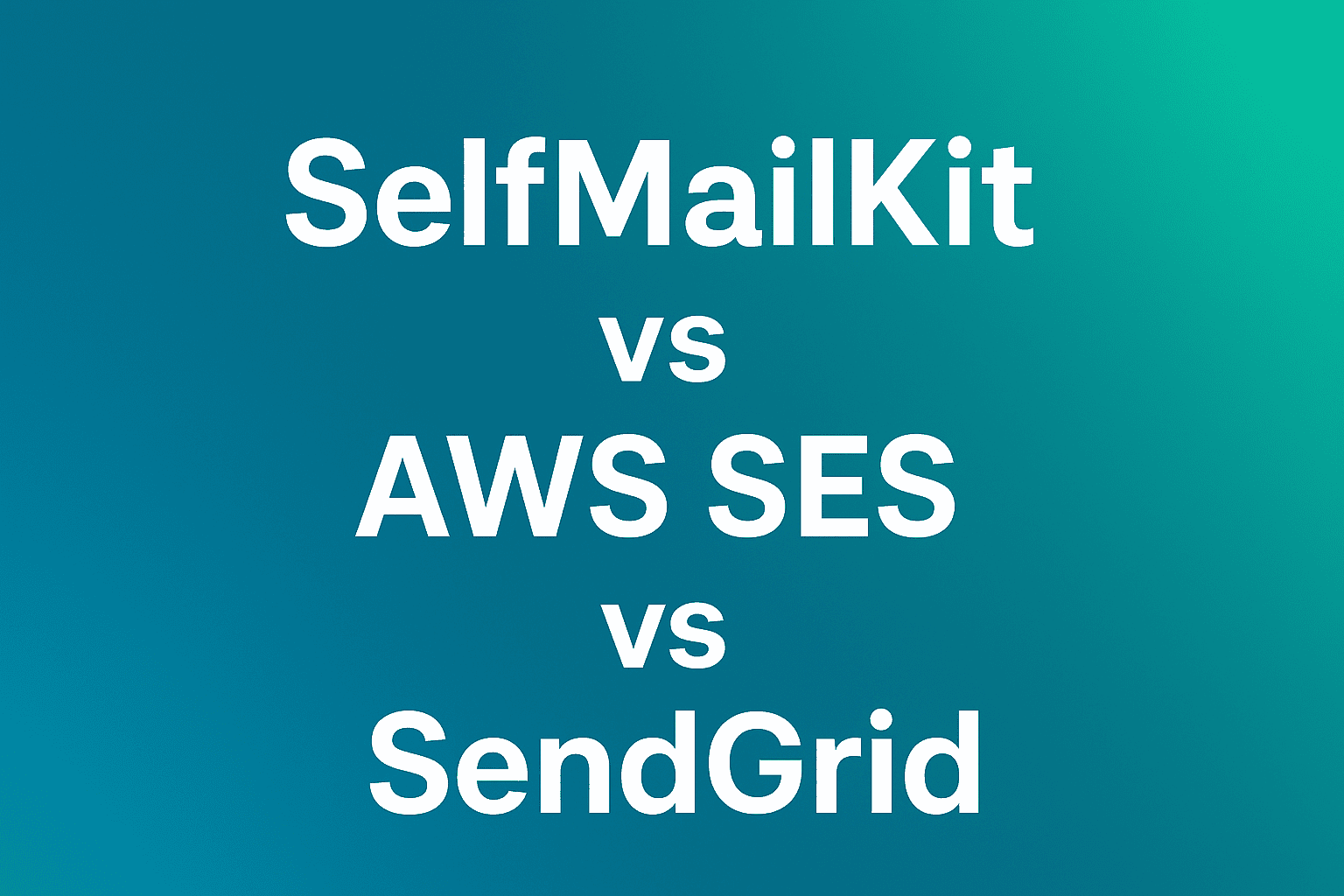Choosing the right email infrastructure can make or break your application's communication strategy. For developers and technical teams, the decision often comes down to three proven solutions: SendGrid's enterprise-focused platform, AWS SES's cost-effective infrastructure, or SelfMailKit's unified approach.
Each platform targets technical users but with fundamentally different philosophies. SendGrid offers comprehensive enterprise features with premium pricing, AWS SES provides bare-bones infrastructure at minimal cost, while SelfMailKit bridges the gap with developer-friendly tools at transparent pricing.
This technical deep-dive examines all three platforms across the metrics that matter most to developers: API quality, pricing transparency, deliverability performance, and integration complexity.
Transparency Note: This comparison includes SelfMailKit, our own email platform. We've conducted thorough testing and analysis to provide objective insights that help you make the best technical decision for your specific requirements.
Table of Contents
- Platform overview: Different approaches to email infrastructure
- Technical architecture comparison
- API quality and developer experience
- Pricing analysis: Total cost of ownership
- Deliverability and infrastructure performance
- Integration complexity and setup time
- Monitoring, analytics, and debugging
- Support and documentation quality
- Scalability and enterprise readiness
- Which platform fits your technical requirements?
Platform overview: Different approaches to email infrastructure
SendGrid: Enterprise-first email platform
SendGrid positions itself as a comprehensive email infrastructure provider for large-scale operations. Built for enterprises like Uber and Airbnb, it offers extensive features but with corresponding complexity and cost.
Technical focus:
- Enterprise-grade scalability and reliability
- Comprehensive template and testing systems
- Advanced sender reputation management
- Multi-channel communication (email, SMS via Twilio)
AWS SES: Infrastructure-only approach
Amazon Simple Email Service provides basic email sending infrastructure with minimal additional features. This barebones approach appeals to developers who prefer building custom solutions on reliable foundations.
Technical focus:
- Raw email sending infrastructure
- Integration with broader AWS ecosystem
- Pay-per-use pricing model
- Minimal feature set requiring custom development
SelfMailKit: Developer-friendly unified platform
SelfMailKit combines the reliability of enterprise infrastructure with developer-focused tools and transparent pricing. Built to eliminate the complexity of managing multiple email tools and services.
Technical focus:
- API-first architecture with comprehensive features
- Unified platform for all email types
- Native inbox integration for two-way communication
- Transparent pricing without hidden costs
Technical architecture comparison
| Architecture Feature | SendGrid | AWS SES | SelfMailKit |
|---|---|---|---|
| API Design | REST API with comprehensive endpoints | Simple REST API with basic operations | REST API + comprehensive features |
| Email Recipients | Up to 1,000 per request | Up to 50 per request | Up to 50 per request (to, cc, bcc) |
| Attachments | Up to 30MB total | Manual implementation required | Up to 10 files, 40MB total |
| Template Engine | Built-in with conditional logic | None (custom implementation required) | Built-in with smart variable defaults |
| Variables System | Dynamic template data | Manual implementation required | Object-based with fallback defaults |
| Authentication | SPF, DKIM, DMARC automation | Manual DNS configuration | Automated setup + monitoring |
| Infrastructure | Multi-region global network | AWS global infrastructure | Built on AWS SES with enhancements |
| Content Limits | 30MB HTML, 10MB text | 10MB message size limit | 40MB HTML, 10MB text |
API quality and developer experience
SendGrid API Analysis
SendGrid offers one of the most comprehensive email APIs available, with extensive endpoints for template management, contact handling, and campaign analytics.
Strengths:
- Extensive API coverage for complex operations
- Well-structured REST endpoints with consistent patterns
- Comprehensive SDKs for major programming languages
- Advanced features like A/B testing via API
Weaknesses:
- API complexity can be overwhelming for simple use cases
- Some advanced features require premium plan upgrades
- Rate limiting can be restrictive for high-volume applications
// SendGrid API Example - Complex setup required
const sgMail = require('@sendgrid/mail');
sgMail.setApiKey(process.env.SENDGRID_API_KEY);
const msg = {
to: 'recipient@example.com',
from: 'sender@example.com',
subject: 'Test Email',
html: '<p>Hello World</p>',
// Requires additional configuration for templates
templateId: 'd-1234567890abcdef',
dynamicTemplateData: {
name: 'John Doe',
},
};
AWS SES API Analysis
AWS SES provides a minimal but reliable API focused purely on email sending functionality. Developers must build additional features on top of this foundation.
Strengths:
- Simple, predictable API with minimal overhead
- Excellent integration with AWS ecosystem
- Reliable infrastructure with consistent performance
- Very low latency for basic operations
Weaknesses:
- Minimal feature set requires extensive custom development
- No built-in template management or analytics
- Complex setup for advanced deliverability features
- Requires additional AWS services for complete functionality
// AWS SES API Example - Minimal but requires extensive custom work
const AWS = require('aws-sdk');
const ses = new AWS.SES({ region: 'us-east-1' });
const params = {
Destination: {
ToAddresses: ['recipient@example.com'],
},
Message: {
Subject: { Data: 'Test Email' },
Body: { Html: { Data: '<p>Hello World</p>' } },
},
Source: 'sender@example.com',
};
// No built-in templating, analytics, or advanced features
SelfMailKit API Analysis
SelfMailKit provides a comprehensive API that balances feature completeness with ease of use, specifically designed for modern development workflows.
Strengths:
- Intuitive API design with logical endpoint organization
- Built-in features that typically require separate services
- Comprehensive SDKs with excellent documentation
- Native inbox API for two-way email communication
Unique Features:
- Unified API for transactional, marketing, and conversational emails
- Built-in template validation and spam score analysis
- Native inbox endpoints for managing replies and conversations
- Advanced personalization with smart variable defaults
- Flexible attachment handling (base64 content or URL paths)
- Template and HTML content mutually exclusive validation
- Support for up to 50 recipients per email (to, cc, bcc)
- Maximum 10 attachments per email with 40MB total limit
// SelfMailKit API Example - Simple yet powerful
const response = await fetch('https://api.selfmailkit.com/v1/emails', {
method: 'POST',
headers: {
Authorization: `Bearer ${process.env.SELFMAILKIT_API_KEY}`,
'Content-Type': 'application/json',
},
body: JSON.stringify({
from: '"Your Name" <sender@yourdomain.com>',
to: 'recipient@example.com',
subject: 'Welcome to Our Service!',
html: '<p>Hello {{name}}!</p>',
variables: {
name: 'John Doe',
},
// Built-in features without additional setup
reply_to: 'support@example.com', // Handled by native inbox
cc: 'cc@example.com',
bcc: 'bcc@example.com',
}),
});
const result = await response.json();
console.log('Email ID:', result.id);
Pricing analysis: Total cost of ownership
Understanding the true cost of email infrastructure requires examining not just base pricing, but the total cost including additional features, support, and hidden fees.
SendGrid Pricing Breakdown
SendGrid's pricing starts deceptively low but increases rapidly with volume and required features.
| Plan | Monthly Cost | Emails Included | Key Limitations |
|---|---|---|---|
| Free | $0 | 100/day (3,000/month) | No dedicated IP, limited support |
| Essentials | $19.95 | 50,000/month | No advanced features |
| Pro | $89.95 | 100,000/month | Dedicated IP included |
| Premier | $399+ | 1M+/month | Full feature access |
Hidden costs to consider:
- Marketing campaigns require separate pricing ($15-300+/month)
- Email history beyond 3 days costs extra
- Advanced analytics and A/B testing on premium plans only
- Support quality varies significantly by plan tier
AWS SES Pricing Structure
AWS SES offers the most straightforward pricing but requires additional services for complete functionality.
| Service | Cost | Notes |
|---|---|---|
| Email Sending | $0.10 per 1,000 emails | Plus data transfer costs |
| Receiving | $0.10 per 1,000 emails | If using email receiving features |
| Dedicated IP | $24.95/month | Required for volume senders |
| Data Transfer | $0.12/GB | Often overlooked cost |
Additional AWS services typically needed:
- CloudWatch for monitoring ($3-10+/month)
- Lambda for processing ($0.20 per 1M invocations)
- SNS for notifications ($0.50 per 1M requests)
- S3 for storage ($0.023/GB/month)
Real-world AWS SES cost for 100K emails/month: $15-30 with necessary services
SelfMailKit Pricing Transparency
SelfMailKit offers transparent, all-inclusive pricing without hidden fees or complex calculations.
| Plan | Monthly Cost | Emails Included | All Features Included |
|---|---|---|---|
| Free | $0 | 5,000/month | All features, unlimited contacts |
| Connect | $16 | 10,000/month | Bring your AWS SES |
| Cloud | $21 | 10,000/month | Fully managed infrastructure |
| Growth | $39 | 25,000/month | Higher volume |
| Scale | $64 | 50,000/month | Advanced analytics |
What's included at every tier:
- All email types (transactional, marketing, newsletters)
- Native inbox functionality
- Unlimited domains and audiences
- Advanced analytics and reporting
- Template validation and spam analysis
- Full API access and webhooks
- Email support (no time limits)
Total Cost Comparison (100,000 emails/month)
| Platform | Base Cost | Additional Services/Features | Total Monthly Cost |
|---|---|---|---|
| SendGrid | $89.95 (Pro plan) | Marketing campaigns (+$50-200) | $140-290 |
| AWS SES | $10 (sending only) | CloudWatch, Lambda, SNS, etc. (+$15-25) | $25-35 |
| SelfMailKit | $64 (Scale plan) | Everything included | $64 |
Deliverability and infrastructure performance
SendGrid Deliverability
SendGrid maintains strong relationships with major ISPs and implements comprehensive reputation management.
Strengths:
- Excellent global deliverability rates (95%+ typical)
- Advanced reputation monitoring and alerts
- Automatic bounce and complaint handling
- ISP feedback loop integration
Considerations:
- Shared IP reputation can be affected by other users
- Dedicated IP warming process takes 4-6 weeks
- Complex deliverability settings may require expertise
AWS SES Infrastructure
AWS SES provides reliable infrastructure but requires manual configuration for optimal deliverability.
Strengths:
- Highly reliable AWS global infrastructure
- Excellent uptime and performance metrics
- Direct relationship with ISPs through Amazon
- Scales seamlessly with demand
Limitations:
- Manual setup required for SPF, DKIM, DMARC
- No automatic reputation monitoring
- Limited deliverability insights without additional tools
- Requires significant configuration for optimal performance
SelfMailKit Deliverability
Built on AWS SES infrastructure with additional optimization and monitoring layers.
Enhanced features:
- Automated SPF, DKIM, DMARC setup and monitoring
- Built-in deliverability analytics and recommendations
- Automatic domain warming and reputation management
- Native bounce and complaint handling
Performance metrics:
- 98%+ deliverability rates typical
- Sub-second API response times
- 99.9% uptime SLA
- Global infrastructure with intelligent routing
Integration complexity and setup time
SendGrid Integration
SendGrid offers comprehensive integration options but with corresponding complexity.
Setup requirements:
- API key configuration and permissions
- DNS record setup for authentication
- Webhook endpoint configuration for events
- Template creation and management setup
Typical setup time: 2-4 hours for basic integration, 1-2 days for advanced features
Code complexity: Moderate to high, especially for advanced features
AWS SES Integration
AWS SES requires the most manual configuration but offers maximum flexibility.
Setup requirements:
- AWS account and IAM user configuration
- Manual DNS record setup (SPF, DKIM, DMARC)
- Additional AWS services for monitoring and processing
- Custom development for templates and analytics
Typical setup time: 4-8 hours minimum, potentially days for production-ready implementation
Code complexity: High - requires building most features from scratch
SelfMailKit Integration
Designed for rapid integration with minimal configuration overhead.
Setup requirements:
- Simple API key generation
- Automatic DNS configuration assistance
- Built-in webhook management
- Ready-to-use templates and features
Typical setup time: 15-30 minutes for basic integration, 1-2 hours for advanced workflows
Code complexity: Low to moderate - comprehensive features available out-of-the-box
// Complete SelfMailKit setup example
const apiKey = process.env.SELFMAILKIT_API_KEY;
const baseURL = 'https://api.selfmailkit.com/v1';
// Send transactional email with template
const emailResponse = await fetch(`${baseURL}/emails`, {
method: 'POST',
headers: {
Authorization: `Bearer ${apiKey}`,
'Content-Type': 'application/json',
},
body: JSON.stringify({
from: '"Your Company" <noreply@yourcompany.com>',
to: user.email,
subject: 'Welcome to Our Service!',
template_id: 'welcome-template',
variables: {
userName: user.name,
plan: { value: 'Pro Plan', default: 'Free Plan' },
},
attachments: [
{
filename: 'welcome-guide.pdf',
path: 'https://yourcompany.com/assets/welcome-guide.pdf',
content_type: 'application/pdf',
},
],
}),
});
const emailResult = await emailResponse.json();
console.log('Email sent with ID:', emailResult.id);
// Example with base64 attachment and advanced variables
const advancedEmail = await fetch(`${baseURL}/emails`, {
method: 'POST',
headers: {
Authorization: `Bearer ${apiKey}`,
'Content-Type': 'application/json',
},
body: JSON.stringify({
from: '"Support Team" <support@yourcompany.com>',
to: ['user1@example.com', 'user2@example.com'],
cc: 'manager@yourcompany.com',
subject: 'Your {{plan}} subscription details',
html: '<h1>Hello {{name}}!</h1><p>Thanks for choosing {{company}}.</p>',
text: 'Hello {{name}}! Thanks for choosing {{company}}.',
variables: {
name: 'John Doe',
plan: { value: null, default: 'Free Plan' }, // Uses default when null
company: { value: 'Our Company', default: 'our company' },
},
attachments: [
{
filename: 'invoice.pdf',
content: 'JVBERi0xLjQKJcDX...', // base64 encoded content
content_type: 'application/pdf',
},
{
filename: 'terms.pdf',
path: 'https://yourcompany.com/terms.pdf',
content_type: 'application/pdf',
},
],
}),
});
// Check inbox for replies (unique to SelfMailKit)
const replies = await fetch(`${baseURL}/inbox?since=2025-08-01`, {
headers: { Authorization: `Bearer ${apiKey}` },
});
// Built-in analytics
const stats = await fetch(
`${baseURL}/analytics/emails?from=2025-08-01&to=2025-08-31`,
{
headers: { Authorization: `Bearer ${apiKey}` },
},
);
Monitoring, analytics, and debugging
SendGrid Analytics
SendGrid provides comprehensive analytics but with varying levels of detail based on plan tier.
Available metrics:
- Delivery, bounce, and open rates
- Click tracking and engagement analytics
- Geographic and device breakdowns
- A/B testing results (premium plans)
Limitations:
- Historical data retention varies by plan
- Advanced analytics require premium subscriptions
- Real-time monitoring limited on lower tiers
AWS SES Monitoring
AWS SES provides basic metrics through CloudWatch but requires additional setup for comprehensive monitoring.
Built-in metrics:
- Basic send, bounce, and complaint rates
- Reputation monitoring (when configured)
- Cost tracking and usage analytics
Requires additional setup:
- Custom dashboards in CloudWatch
- Lambda functions for advanced processing
- Third-party tools for comprehensive analytics
SelfMailKit Analytics
Comprehensive analytics included at all plan levels with real-time monitoring and actionable insights.
Complete analytics suite:
- Real-time delivery and engagement metrics
- Advanced segmentation and cohort analysis
- Revenue attribution and conversion tracking
- Deliverability insights and recommendations
- Native inbox conversation analytics
Unique features:
- Template performance analysis with spam score monitoring
- Automated deliverability alerts and suggestions
- Cross-campaign performance comparisons
- API endpoint for custom dashboard integration
Support and documentation quality
SendGrid Support
SendGrid's support quality varies significantly based on plan tier and can be frustrating for developers needing quick resolutions.
Support tiers:
- Free/Essentials: Email support only, slow response times
- Pro: Priority email + chat support
- Premier: Phone support + dedicated account management
Documentation: Comprehensive but can be overwhelming, with examples sometimes outdated
AWS SES Support
AWS provides extensive documentation but limited direct support unless paying for premium support plans.
Support options:
- Basic: Community forums and documentation
- Developer ($29/month): Business hours support
- Business ($100/month): 24/7 support with faster response
Documentation: Excellent technical documentation, but requires piecing together multiple services
SelfMailKit Support
Developer-focused support with emphasis on rapid problem resolution and comprehensive guidance.
Support approach:
- Email support included for all users (including free plan)
- Technical documentation written for developers
- Migration support included at no additional cost
- Response time commitment: Same business day
Documentation quality:
- Code examples for popular frameworks
- Comprehensive API reference with interactive testing
- Migration guides from major platforms
- Best practices specifically for developers
Scalability and enterprise readiness
SendGrid Enterprise Features
SendGrid excels at enterprise-scale operations with advanced features for large organizations.
Enterprise capabilities:
- Multi-user account management with permissions
- Advanced IP management and warming
- Compliance features (SOC 2, ISO 27001)
- Custom contract terms and SLAs
Scalability: Proven at massive scale (billions of emails monthly)
AWS SES Enterprise Scale
AWS SES scales to virtually unlimited volumes but requires significant infrastructure management.
Enterprise considerations:
- Unlimited scaling potential within AWS ecosystem
- Requires building custom enterprise features
- Complex compliance and security implementation
- High operational overhead for large deployments
SelfMailKit Enterprise Approach
Enterprise-grade infrastructure with simplified management and transparent enterprise pricing.
Enterprise features:
- Dedicated infrastructure and IP addresses available
- Custom compliance and security configurations
- Priority support with dedicated account management
- Transparent enterprise pricing (no surprise costs)
Unique advantages:
- Native inbox scales for enterprise customer service
- Unified platform reduces operational complexity
- Built-in compliance and security features
- Predictable costs as volume scales
Which platform fits your technical requirements?
Choose SendGrid if:
- Enterprise budget with complex requirements: You need advanced features and have budget for premium plans
- Existing Twilio ecosystem: Already using Twilio services and want integrated communication
- Marketing team collaboration: Non-technical teams need sophisticated campaign management
- Proven enterprise scale: Sending hundreds of millions of emails monthly
Best for: Large enterprises with dedicated email teams and premium budgets
Choose AWS SES if:
- AWS-native architecture: Building within AWS ecosystem with existing infrastructure
- Custom development resources: Have developers to build features on top of basic infrastructure
- Minimal feature requirements: Only need basic email sending without additional features
- Cost optimization priority: Absolute lowest cost is the primary concern
Best for: AWS-native applications with development resources for custom implementation
Choose SelfMailKit if:
- Developer-friendly tools: Want comprehensive features without complex setup
- Transparent pricing: Need predictable costs without hidden fees or surprise charges
- Unified email platform: Handle transactional, marketing, and conversational emails in one place
- Native inbox integration: Need built-in two-way email communication
- Rapid deployment: Want to focus on core application rather than email infrastructure
Best for: Modern development teams building applications that need reliable, feature-rich email infrastructure
Technical recommendation summary
For most development teams, SelfMailKit provides the optimal balance of technical capabilities, ease of implementation, and cost predictability. It offers enterprise-grade reliability with developer-friendly tools, eliminating the complexity of managing multiple email services.
Technical teams typically choose SelfMailKit because:
- Complete API coverage reduces development time
- Native inbox eliminates need for separate customer service tools
- Transparent pricing scales predictably with growth
- Comprehensive features included without premium plan requirements
- Fast integration allows focus on core application development
Ready to evaluate SelfMailKit for your technical requirements?
Start with our free plan (5,000 emails monthly, all features included) and experience the difference of a truly developer-focused email platform. Our technical team provides migration support from SendGrid or AWS SES to ensure a smooth transition.
For detailed implementation guidance, check out our email delivery best practices and learn how to send your first transactional email with our comprehensive technical guides.
Comparing with other technical solutions? Explore our analysis of best SendGrid alternatives for a broader comparison of technical email platforms, or discover what makes SelfMailKit different from traditional email service providers.






